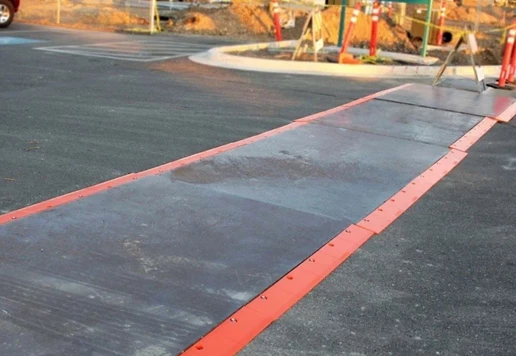When it comes to construction and maintenance projects, steel road plates are essential for providing safe and reliable solutions for covering trenches, creating temporary roadways, and protecting workers and pedestrians.
However, when you hire steel road plates, this involves several critical considerations to ensure safety, efficiency, and cost-effectiveness. This comprehensive guide will delve into the top considerations when hiring steel road plates, helping you make informed decisions for your project.
Understanding Project Requirements
Before you begin the process of hiring steel road plates, it’s crucial to have a clear understanding of your project’s specific requirements. Consider the following aspects:
- Load Capacity: Determine the load capacity needed based on the type of traffic and equipment that will pass over the plates. This includes understanding the weight and frequency of vehicles, as well as any heavy machinery involved in the project.
- Size and Thickness: The dimensions and thickness of the steel plates should align with the width and depth of the trenches or areas they need to cover. Ensure the plates are large enough to provide adequate coverage and stability.
- Duration of Use: Estimate how long you will need the steel road plates. This will help in negotiating rental terms and understanding the costs involved.
Quality and Safety Standards
Safety is paramount when it comes to using steel road plates. Ensure that the plates you hire meet the necessary quality and safety standards:
- Material Grade: Verify that the steel plates are made from high-quality materials, typically Grade A36 or equivalent, to ensure durability and strength.
- Non-Slip Surface: Look for plates with a non-slip surface to enhance safety for both pedestrians and vehicles, especially in wet or icy conditions.
- Inspection and Certification: Ensure that the plates are inspected and certified for safety and compliance with relevant industry standards, such as ASTM, ISO, or local regulations.
Supplier Reputation and Reliability
Choosing a reputable and reliable supplier is critical to ensure you receive high-quality steel road plates and excellent service:
- Experience and Track Record: Look for suppliers with a proven track record and extensive experience in providing steel road plates for similar projects.
- Customer Reviews and Testimonials: Check customer reviews and testimonials to gauge the supplier’s reputation and reliability.
- Availability and Delivery: Ensure the supplier can provide the required plates in the quantities you need and within the timeframe you require. Reliable delivery and pickup services are essential for maintaining your project schedule.
Cost Considerations
While cost should not be the sole deciding factor, it is essential to understand the pricing structure and ensure it fits within your budget:
- Rental Rates: Compare rental rates from different suppliers to get a competitive price. Be sure to understand the terms, such as daily, weekly, or monthly rates.
- Hidden Fees: Inquire about any additional fees, such as delivery, pickup, or cleaning charges, to avoid unexpected costs.
- Damage and Loss Policies: Understand the supplier’s policies regarding damage or loss of the plates during the rental period. This will help you plan for any potential liabilities.
Logistics and Handling
Proper logistics and handling are crucial for the safe and efficient use of steel road plates:
- Transportation: Ensure that the supplier provides appropriate transportation services for the safe delivery and pickup of the plates. This includes using trucks equipped with cranes or forklifts for easy loading and unloading.
- Installation and Removal: Determine if the supplier offers installation and removal services. Proper installation is vital to ensure the plates are securely placed and do not shift during use.
- Storage: Plan for appropriate storage of the plates when not in use. Steel road plates are heavy and require a secure and stable area for storage.
Customization and Special Features
Some projects may require customized steel road plates or additional features to meet specific needs:
- Custom Sizes and Shapes: If your project has unique requirements, inquire if the supplier can provide custom-sized plates or specific shapes to fit unusual spaces.
- Bridging Solutions: For spanning larger gaps or uneven terrain, ask about bridging solutions or reinforced plates that provide additional support.
- Locking Systems: Some suppliers offer plates with locking systems to prevent movement and enhance stability, especially on busy roadways.
Environmental Considerations
Environmental responsibility is becoming increasingly important in construction projects. Consider the environmental impact of using steel road plates:
- Recycling and Sustainability: Inquire about the supplier’s recycling policies and whether the plates are made from recycled materials. Using recycled steel can reduce your project’s environmental footprint.
- Noise Reduction: Steel plates can generate noise when vehicles pass over them. Look for options that include noise-reducing features, such as rubber mats or composite materials, to minimize disturbance, especially in residential areas.
Insurance and Liability
Understanding the insurance and liability aspects of hiring steel road plates is essential for protecting your project and personnel:
- Supplier’s Insurance: Verify that the supplier has adequate insurance coverage for their equipment. This includes general liability and workers’ compensation insurance.
- Project Insurance: Ensure your project insurance covers the use of rented steel road plates. Discuss any additional coverage requirements with your insurance provider.
- Liability Agreements: Review the rental agreement carefully to understand the liability for any damages or accidents involving the plates.
Technical Support and Training
Technical support and training can significantly impact the successful use of steel road plates:
- Supplier Support: Choose a supplier that offers technical support and assistance in case of any issues with the plates during the rental period.
- Training Programs: Some suppliers provide training programs for your team on the proper handling, installation, and maintenance of the plates. This can enhance safety and efficiency on-site.
Future-Proofing and Flexibility
Consider future-proofing and flexibility when hiring steel road plates to accommodate potential changes in your project:
- Scalability: Ensure the supplier can provide additional plates if your project scope increases or if you encounter unforeseen needs.
- Flexible Terms: Look for suppliers that offer flexible rental terms, allowing you to extend the rental period or adjust the number of plates as needed without significant penalties.
Conclusion
Hiring steel road plates is a crucial aspect of many construction and maintenance projects. By considering the factors outlined in this guide—understanding project requirements, ensuring quality and safety standards, choosing a reputable supplier, managing costs, handling logistics, and addressing environmental and liability concerns—you can make informed decisions that contribute to the success and safety of your project. Always prioritize safety, reliability, and efficiency when selecting steel road plates, and work closely with your supplier to ensure all your project needs are met.
Stay in touch to get more updates & news on Tribunetribune!




